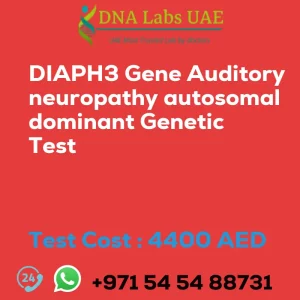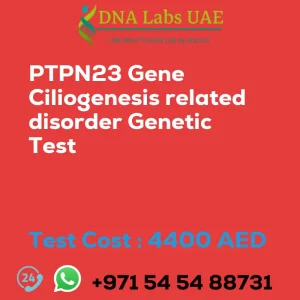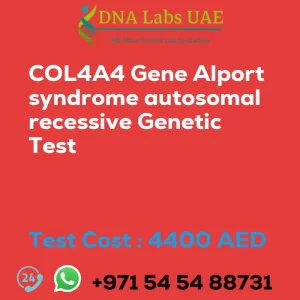MARVELD2 Gene Deafness Autosomal Recessive Type 49 Genetic Test
Test Name: MARVELD2 Gene Deafness Autosomal Recessive Type 49 Genetic Test
Components: MARVELD2 gene analysis
Price: AED 4400.0
Sample Condition: Blood or Extracted DNA or One drop Blood on FTA Card
Report Delivery: 3 to 4 Weeks
Method: NGS Technology
Test Type: Ear Nose Throat Disorders
Doctor: ENT Doctor
Test Department: Genetics
Pre Test Information: Clinical History of Patient who is going for PTPN23 Gene Ciliogenesis related disorder NGS Genetic DNA Test. A Genetic Counselling session to draw a pedigree chart of family members affected with PTPN23 Gene Ciliogenesis related disorder NGS Genetic DNA Test gene PTPN31
Test Details:
The MARVELD2 gene is associated with deafness, specifically autosomal recessive type 49 (DFNB49). Autosomal recessive means that an individual must inherit two copies of the mutated gene (one from each parent) in order to develop the condition.
NGS (Next-Generation Sequencing) genetic testing is a method used to analyze multiple genes simultaneously, allowing for the identification of genetic variations that may be associated with certain conditions or diseases. In the case of MARVELD2 gene deafness, an NGS genetic test would analyze the MARVELD2 gene to determine if there are any mutations or variations present that could contribute to the development of autosomal recessive type 49 deafness.
The NGS genetic test would involve obtaining a sample of DNA, typically through a blood or saliva sample, and then sequencing the MARVELD2 gene to identify any potential mutations. The results of the test would indicate whether an individual has any mutations in the MARVELD2 gene that could lead to deafness.
It is important to note that genetic testing for deafness can help provide a diagnosis or risk assessment, but it may not be able to predict the severity or progression of the condition. Additionally, genetic testing may have limitations, such as not detecting all possible mutations or variations that could be associated with the condition. Therefore, it is recommended to consult with a genetic counselor or healthcare professional to fully understand the implications of genetic testing and its results.
| Test Name | MARVELD2 Gene Deafness autosomal recessive type 49 Genetic Test |
|---|---|
| Components | |
| Price | 4400.0 AED |
| Sample Condition | Blood or Extracted DNA or One drop Blood on FTA Card |
| Report Delivery | 3 to 4 Weeks |
| Method | NGS Technology |
| Test type | Ear Nose Throat Disorders |
| Doctor | ENT Doctor |
| Test Department: | Genetics |
| Pre Test Information | Clinical History of Patient who is going for PTPN23 Gene Ciliogenesis related disorder NGS Genetic DNA Test. A Genetic Counselling session to draw a pedigree chart of family members affected with PTPN23 Gene Ciliogenesis related disorder NGS Genetic DNA Test gene PTPN31 |
| Test Details |
The MARVELD2 gene is associated with deafness, specifically autosomal recessive type 49 (DFNB49). Autosomal recessive means that an individual must inherit two copies of the mutated gene (one from each parent) in order to develop the condition. NGS (Next-Generation Sequencing) genetic testing is a method used to analyze multiple genes simultaneously, allowing for the identification of genetic variations that may be associated with certain conditions or diseases. In the case of MARVELD2 gene deafness, an NGS genetic test would analyze the MARVELD2 gene to determine if there are any mutations or variations present that could contribute to the development of autosomal recessive type 49 deafness. The NGS genetic test would involve obtaining a sample of DNA, typically through a blood or saliva sample, and then sequencing the MARVELD2 gene to identify any potential mutations. The results of the test would indicate whether an individual has any mutations in the MARVELD2 gene that could lead to deafness. It is important to note that genetic testing for deafness can help provide a diagnosis or risk assessment, but it may not be able to predict the severity or progression of the condition. Additionally, genetic testing may have limitations, such as not detecting all possible mutations or variations that could be associated with the condition. Therefore, it is recommended to consult with a genetic counselor or healthcare professional to fully understand the implications of genetic testing and its results. |








